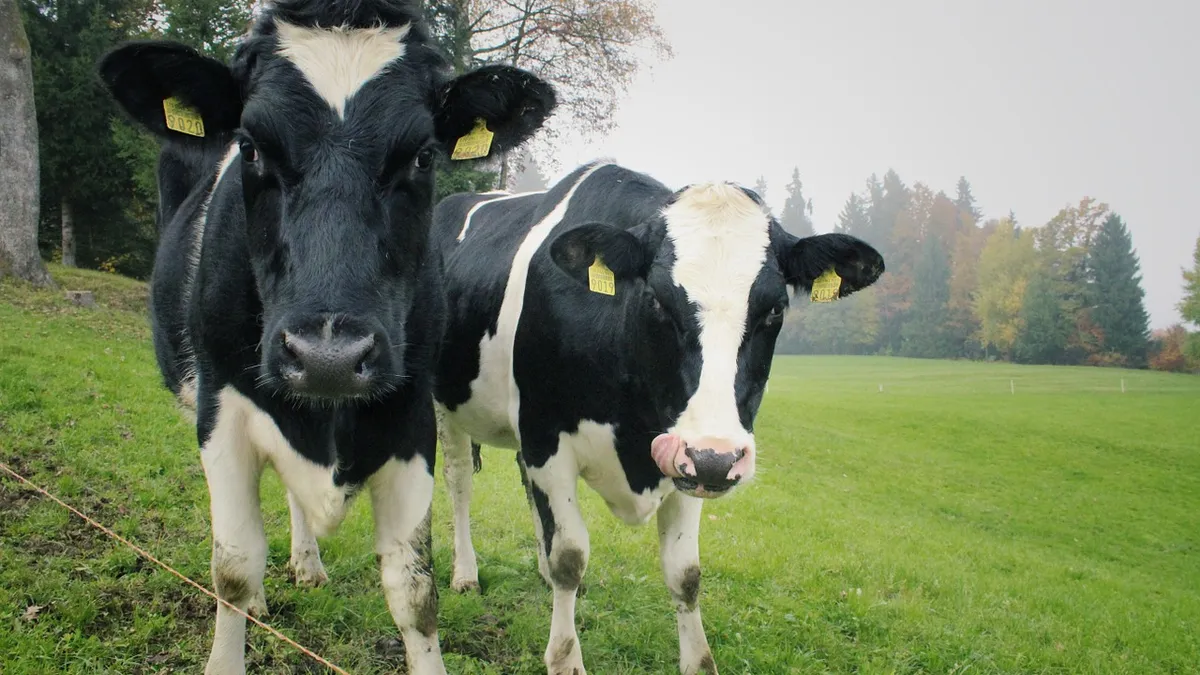Dive Brief:
- The Innovation Center for U.S. Dairy formally debuted the Net Zero Initiative Monday, an industry effort to help dairy farms implement new technologies and more sustainable practices to work toward a goal of carbon neutrality and improved water usage by 2050.
- The center also announced a commitment of as much as $10 million and a multi-year partnership with food giant Nestlé to help toward carbon neutrality by scaling access to sustainable resources and practices on U.S. farms.
- Nestlé, which makes brands with dairy like Carnation, Stouffer's and DiGiorno, is the first major partner for the initiative, the center said in the release. Nestlé's involvement could push other big companies to join the Net Zero Initiative and contribute funding.
Dive Insight:
Nestlé has already commited to achieving zero net greenhouse gas emissions by 2050, saying last year that one of the ways it was doing this was through improved management of its dairy supply chain. In the release announcing its new financial commitment, Jim Wells, chief supply chain officer for Nestlé USA, said supporting farmers through the Net Zero Initiative could "transform the dairy industry."
But it will likely need to be a collective effort. A report last year found the vast majority of large meat and dairy companies "have yet to meaningfully address even the most basic sustainability risks."
The top agricultural source of greenhouse gases globally is cattle, with one cow belching roughly 220 pounds of methane each year, according to University of California, Davis. Specifically, the United Nations' Food and Agriculture Organization estimates the dairy sector globally contributes roughly 4% of total greenhouse gas emissions.
"We know a lot more is possible — proven science and evidence from dairy’s existing best practices tells us we can get to net zero," Mike Haddad, chairman of the Innovation Center for U.S. Dairy, said in a statement.
But there has been some progress in recent years. Improvements in breeding, genetics and nutrition can make dairy production more environmentally efficient. By using modern management practices and improving cow feed and genetics, the environmental impact of making a gallon of milk has dropped. From 2007 to 2017, it required 30% less water, 21% less land and a 19% smaller carbon footprint, according to the Innovation Center for U.S. Dairy.
This initiative is pushing bigger goals for the industry to become fully carbon neutral, improve water quality and maximize recycling in the next 30 years. Using science, new technology and on-farm pilots, the Net Zero Initiative wants to help eliminate the cost barriers and create incentives for farmers to achieve those goals.
More companies in the dairy industry are already pushing for more sustainable practices, especially carbon neutrality. Two months ago, Marfrig and the Brazilian Agricultural Research Corporation (Embrapa) launched a new line of sustainable, carbon-neutral beef called Viva. And earlier this year, Horizon Organic, which is owned by Danone, committed to becoming carbon positive by 2025.
It makes sense that Nestlé and potentially other large companies would be interested in joining the initiative and pledging money because consumers are increasingly considering the sustainability of the products they purchase, even during the pandemic.
Amid a shift toward more sustainable sourcing for food, many consumers have turned to plant-based alternatives. From milk and cheese to ice cream and yogurt, alternatives are becoming more popular in the marketplace and many in the traditional dairy industry have said they aren't doing enough to promote the work they're doing to help farmers and the environment. Showing off those efforts with the Net Zero Initiative could help bring more consumers back to dairy.














